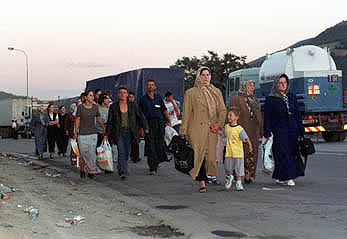Balkan confidence-building measures proposed
Balkan confidence-building measures proposed

GENEVA, JULY 27 (UNHCR) - After escorting a group of displaced civilians on a go-and-see visit to a disputed region of the country, the U.N. Refugee Agency Friday proposed a series of confidence-building measures to try to ease tensions in the Former Yugoslav Republic of Macedonia (FYROM).
High Commissioner Ruud Lubbers suggested that his agency could, resources permitting, help in a series of areas ranging from assisting returnees, ensuring security and human rights, monitoring and vital documentation.
Specifically his proposals included:
- Expanding UNHCR's work on citizenship and documentation issues and easing the return of refugees without proper documentation or residency.
- Employing the agency's expertise in international monitoring and protection, including a presence at border crossings, ethnically mixed areas and collective centres.
- With other agencies, providing emergency housing repairs for returnees.
- Identifying quick-impact projects such as job-generating projects and minor infrastructure repairs for mixed communities.
- Promoting dialogue between groups in mixed villages.
- Ensuring security and human rights through monitoring and reporting procedures.
- Ensuring that smaller displaced minority groups, such as the Roma, are included in the confidence-building measures.
Thursday, 120 displaced civilians were escorted to their village of Lesok in the disputed Tetovo area on a go-and-see visit to decide whether to return. Ten to fifteen people agreed to the stay, but the others, citing security fears and damage to their homes, returned to the capital, Skopje. Further visits were planned for the next few days, with government officials and NATO urging UNHCR to become involved in the return process.
"It's going to be a gradual process but we're glad it is starting quickly, because the longer people stay away from their homes, the more difficult return becomes," Ron Redmond, a spokesman in Geneva, said.
Despite the continuing tension, more refugees have returned to the country from neighbouring Kosovo than people leaving. A total of 1,491 civilians came home in the period Sunday to Wednesday, compared with 735 persons going to Kosovo.
A total of 76,309 persons left for Kosovo since fighting broke out in February, and 17,157 returned. A further 30,000 people were estimated to be displaced within FYROM.



